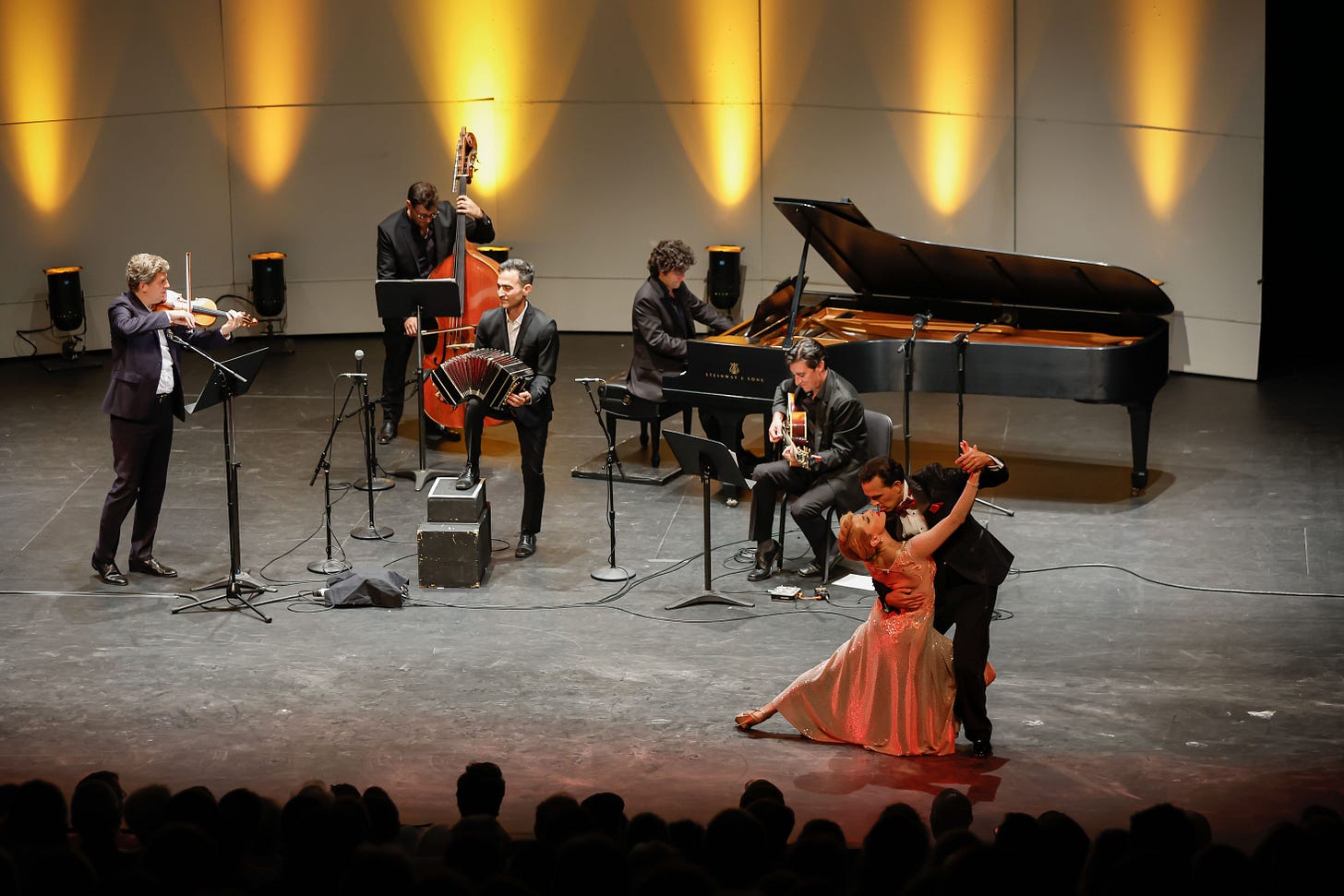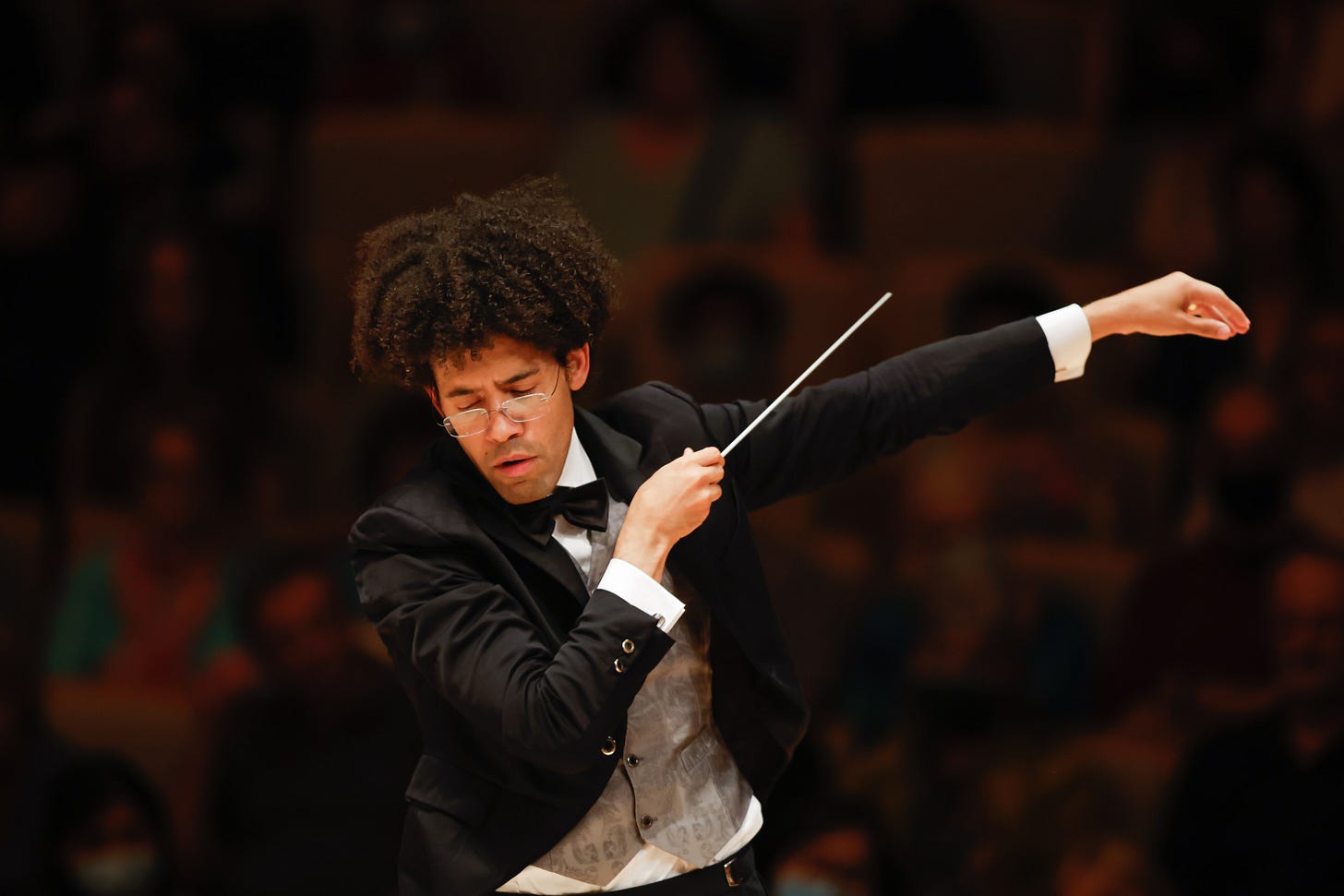Music: Choose your own adventure
In Montreal, a musical spree or joyride or something
It’s going better for musicians, but still not great. COVID-19 remains a respiratory disease. Even when it’s hardly worse than a cold, it can ruin a week for people who exhale for a living — wind players, choristers; for people who sit next to them for a living; and for their audiences. Live concerts are back, but ticket sales sure aren’t. Audiences are nervous about catching a bug or tired of wearing a mask. Landing a gig is no assurance of being able to play it. In New York this week, a trumpeter (Riley Mulherkar) is subbing in for a pianist (David Virelles) who has to replace a guitarist (Bill Frisell) who’s out with COVID from a prestige gig (the Village Vanguard). Normal is still a long way off.
That’s why the Orchestre symphonique de Montréal’s “Virée classique” mini-festival this weekend was such a balm. I remain a fan of this annual August smorgasbord of concerts, whose ninth edition took place from Friday night to Sunday afternoon: 24 concerts in 44 hours on four indoor stages around the Place des Arts complex. Ensemble sizes ranging from solos and duets up to a full orchestra. No ticket price over $45, and many as low as $10. No concert longer than an hour. When our kids were younger, it was an ideal way to expose them to classical music, because right at the point when young attention spans fade (and often older attention spans with them), the concert’s over. These days the kids are older so we just go without them.
I am aware of no other event anywhere that makes so much good classical music available while so completely freeing audiences of any fear that, by entering a concert hall, they might be sentencing themselves to a daunting stuffy marathon.
The OSM translates “Virée classique” as “Classical Spree,” which to my ears sounds goofy and off-putting. But it’s hard to find a really satisfying translation. The term “virée” means, approximately, a light-hearted excursion. Classical Spin, maybe. Classical Window-Shopping, perhaps. Classical Joyride? Maybe keep it simple: Classical Excursion. It adds up to a choose-your-own adventure. On Saturday between late morning and dinnertime, the festival’s densest stretch, we had 16 concerts to choose from. That meant skipping, with varying degrees of regret, concerts that featured six marimbas, four bassoons, a single four-stringed jumbo Venezuelan ukulele called a cuatro, and the OSM’s house organist accompanying silent films by Buster Keaton and Charlie Chaplin.
Instead our spree (blitz? Amble?) began on Friday with the American saxophonist Steven Banks playing two pieces with a string quartet and one with an ensemble that included flute, harp and celeste.
Banks was a late substitute for Branford Marsalis, who cancelled for knee surgery. A decent trade: Marsalis is tremendously engaging, but Banks has the consistency of someone who plays only classical music, expressed in a clear focused tone without exaggerated vibrato. The concert was in itself a grab-bag — a few minutes of Debussy for solo flute, a mildly challenging piece written a decade ago by the American Ellen Taaffe Zwilich — but just when you might start to wonder whether it all had a connecting thread, it was over. A feature, not a bug.
Saturday for us began with Hao Zhou, the California violinist, in an entertaining duet with Montreal pianist Philip Chiu.
Zhou, now 25, has lost some baby fat since he won Montreal’s leading international competition for classical soloists in 2019. That was the year I heard him win the Banff International String Quartet Competition and called him “a howitzer.” He’s a bit better at understatement now. The pyrotechnics now come across as effortless. I’m confident he’ll have a grand career, and it’s a good thing. Zhou and Chiu hadn’t met before last week. Their concert, mostly Americana, benefited from an easy rapport between them.
These August OSM festivals often feature a big international star who sticks around for a few concerts. This year that would have been Marsalis if not for the bum knee, but the description also fits James Ehnes, the Manitoba-born violinist who’s a leading soloist worldwide. He played a concerto with the orchestra on Friday, but on Saturday he joined an excellent pickup band to play arrangements by the Argentinian tango revolutionary Astor Piazzolla. They even had dancers on hand for two tunes.
Piazzolla is nearly a local hero in Montreal. He played there often and his photo hung over a doorway in the old Spectrum club. (If you don’t know his music, might as well dive in the deep end: start with the classic 1986 Tango: Zero Hour album.) The concert was organized by Jonathan Goldman, a Université de Montréal musicologist who plays serious bandoneón, the name for Piazzolla’s distinctive button accordion. The group was excellent, if genteel compared to Piazzolla’s often harrowing recordings.
All of this was pretty much a warm-up for Saturday’s main event, the return of pianist Bruce Liu for his first orchestral concert in his adopted hometown of Montreal since he became the first Canadian to win the International Chopin Piano Competition in Warsaw. Winning the Chopin Competition is a certifiably big deal. It essentially guarantees a life as a high-profile international soloist. The best news is that Liu obviously deserved it. He’s an old soul who studies the bold, individualistic soloists of the early 20th century. His playing has heart, not just technique.
It’s a good thing I knew that walking in, because it wasn’t evident from this concert. Liu’s chosen showcase, Rachmaninoff’s Rhapsody on a Theme of Paganini, came off more as a promissory note than as a triumphant homecoming. It’s a virtuoso showcase, a portable fireworks show. Liu and the orchestra spent much of its length disagreeing about questions of balance. The OSM, usually a precision ensemble, was unusually approximate here. Short rehearsals in a busy week, one suspects. Anyway it all left little clear impression of Liu’s ability. What I did hear was a musician who was often most impressive with sudden moments of quiet lyricism after the pyrotechnics. Liu will be heard next with orchestras in Ottawa and Toronto. The Chopin Étude he played for an encore, all muscle under velvet, suggested there’ll be many chances to hear him to advantage in the future.
The weekend’s biggest surprise came next, after Liu left the stage and the orchestra was alone with its music director, Rafael Payare.
I’ve written about the OSM’s conductor before, at the old shop. He’s 42, lean and gangly with Sideshow Bob hair. He’s Venezuelan, has another medium-profile orchestra position in San Diego, had one in Belfast. He’s not a celebrity even by classical-music standards, I’m saying. Which makes me think well, provisionally, of the OSM for choosing him. They are, by a country mile, Canada’s highest-profile orchestra, so he must have been hired for reasons of musical rapport, not marketing potential.
The whole situation is an interesting challenge for the OSM. The city’s other major orchestra, the Orchestre métropolitain, is led by one of the most famous musicians in the world. That’s Yannick Nézet-Séguin, a Montreal kid whom the OSM could, and ostentatiously did, ignore for many years while he was learning his craft at an orchestra with shorter history, fewer concerts and a fraction of the budget of the OSM.
The thing is, Yannick (as everyone calls him, partly because Americans can’t pronounce the rest of his name) has spent the last five years becoming the most important orchestral conductor in the United States. I mean, perhaps the most prominent conductor since Leonard Bernstein. When PBS broadcast a concert to mark the 20th anniversary of 9/11, the chosen conductor was Nézet-Séguin. When the Metropolitan Opera staged its first opera by a Black composer, Terence Blanchard’s Fire Shut Up In My Bones, Nézet-Séguin led the orchestra. When Carnegie Hall suddenly couldn’t have a Russian conductor and notorious Putin crony leading the Vienna Philharmonic in the first days of Russia’s invasion of Ukraine, Nézet-Séguin got the call. Nézet-Séguin is five years older than Payare — the first time he’s been the older man in the cross-town rivalry — more fluent in French and English, more familiar to TV audiences and municipal power brokers.
I’m sure the effect was all unintended, but in the days leading up to the Virée Classique, Nézet-Séguin was impossible to miss. He conducted the Métropolitain in front of 50,000 at the foot of Mount Royal…
… and led the orchestra in Instagram birthday greetings for Montreal tennis player Félix Auger-Aliassime, dressed like this:
On the night I was in Montreal watching Payare, Nézet-Séguin was in Saratoga Springs, three hours down the road, with his other band, the Philadelphia Orchestra, leading Beethoven’s 9th Symphony. He tends to flood the zone, is my point.
The OSM has always been the more formal of the city’s two orchestras, the one with pedigree. Despite the fun hair, Payare turns out to be in that lineage. He favours not just a tux, but tails:
He’s relaxed and funny in conversation, unpretentious. He gamely conducted a free concert for passersby during the festival. But he can’t yet hang with Montrealers as effortlessly as the local hero. In the end, that serious side was the key to his biggest success of the weekend.
As a Venezuelan in a city with a lot of affinity for Latin America (former premier Bernard Landry used to call Quebecers Los latinos del norte and get away with it), Payare has been conducting more South American composers than any of his predecessors. Russians and French and Germans too, but also lots of music from closer to his home.
He did that on Saturday, following Liu’s star turn with a performance of the Bachianas Brasileiras No. 7, by the Brazilian composer Heitor Villa-Lobos. You’re forgiven if you don’t know it. Villa-Lobos wrote nine suites combining Brazilian folk influences with harmonies and structures drawn from Bach. On paper it sounds like a wilfully academic exercise. In person, the suite Payare selected was charming, dance-like — until the last of the four movements.
Villa-Lobos ended his 7th Bachianas with a vast, minor-key fugue, very much in Bach’s style. It’s dark, majestic stuff, lines of strings and low brass intertwining for seven minutes that sound like fate’s final victory. The OSM played as though they were very much aware the boss was watching. The boss conducted as though he had something to prove. The orchestra’s trademark precision was back, and its seriousness of purpose. This slight and amiable conductor seems drawn to the heaviest material in the library, Shostakovich, Schnittke, a sprawling fugue. He turns it into his best moments. I’ll be keeping my eye on this guy.












Love you mixing it up with this excellent review. Bookmarking the Virée as an experience to enjoy with our boys.
My suggestion:
Virée classique OSM À la carte